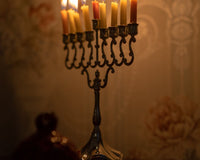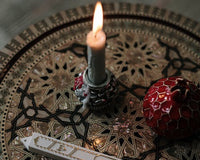What are Kippahs
Kippahs, also known as yarmulkes, are small brimless caps worn by Jewish men as a sign of reverence and humility before God. Kippahs are typically made of a small circle of cloth, often decorated with a design or symbol, and are placed on the top of the head. Jewish tradition holds that covering one's head is a symbol of respect for God and a recognition of His presence in all aspects of life. While kippahs are traditionally worn by men, some women also choose to wear them as a sign of religious observance. Kippahs come in a variety of colors, materials, and designs, and can be purchased at many Jewish stores or online retailers.
History of Kippahs
The history of kippahs is a complex and varied one, with different styles and traditions developing over time in different parts of the Jewish world.
The use of a head covering in Jewish worship dates back at least to the Talmudic period (2nd to 5th centuries CE), when the rabbis taught that it was a sign of respect to cover one's head during prayer. However, the specific form and style of the kippah evolved over time.
In medieval Europe, it became common for Jewish men to wear a head covering at all times, not just during prayer. This was partly out of respect for God, but also as a way to identify themselves as Jews in a Christian-dominated society. The style of the kippah during this period was often a simple, unadorned cap made of wool or other fabric.
In the 19th and early 20th centuries, as Jews migrated to the United States and other parts of the world, kippah styles continued to evolve. Some Jews began to wear more elaborate kippahs, with embroidery or other decorative elements. Others chose to wear smaller, more discreet kippahs.
Today, kippahs come in a wide variety of styles, materials, and designs, reflecting the diverse traditions and communities within the Jewish world. Some Jews wear kippahs as a sign of religious devotion and identity, while others choose not to wear them at all. The use of a head covering remains an important aspect of Jewish tradition, but the specific form and style of the kippah continues to evolve over time.
Importance of Kippahs
Kippahs hold great importance in Jewish tradition, and are considered a symbol of reverence and humility before God. There are several reasons why kippahs are significant:
-
Respect for God: Covering one's head is seen as a sign of respect for God's presence in all aspects of life. By wearing a kippah, Jewish men (and some women) show that they acknowledge and honor God's presence.
-
Identification: In many Jewish communities, wearing a kippah is a sign of Jewish identity. It is a way for Jews to identify themselves as part of the larger Jewish community, and to express their pride in their heritage.
-
Remembrance: Kippahs are often worn during prayer, to help focus the mind and create a sense of sacred space. They can also serve as a reminder of one's obligations as a Jew, and of the importance of living a life of faith and righteousness.
-
Tradition: Kippahs have been worn by Jewish men for centuries, and have become an important part of Jewish tradition and ritual. They are often passed down from father to son, and are a tangible link to the generations of Jews who came before.
While not all Jews choose to wear kippahs, they remain an important symbol of Jewish identity and tradition for many.
Uses of Kippahs
Kippahs have several uses in Jewish tradition, including:
-
Religious Observance: Wearing a kippah is a sign of religious observance, and is often required during prayer services, synagogue attendance, and other religious rituals. In some Jewish communities, it is also customary to wear a kippah at all times as a sign of respect for God.
-
Cultural Identity: Kippahs are an important symbol of Jewish identity, and wearing one can help individuals feel a sense of connection to the larger Jewish community.
-
Commemoration: Kippahs are sometimes used as a way to commemorate important events or milestones, such as weddings, bar mitzvahs, or funerals. They may be personalized with the names of the individuals or event being commemorated.
-
Gift-giving: Kippahs are often given as gifts, particularly during holidays or other special occasions. They may be personalized with the recipient's name or other details, and can serve as a meaningful keepsake.
-
Fashion: While not traditionally a fashion item, kippahs have become increasingly popular as a way to express individual style or personality. They come in a wide variety of colors, designs, and materials, and can be worn to complement or enhance an outfit.
Overall, kippahs serve multiple purposes in Jewish tradition, from religious observance to cultural identity to personal expression.
Shop our full collection of Kippahs here.






